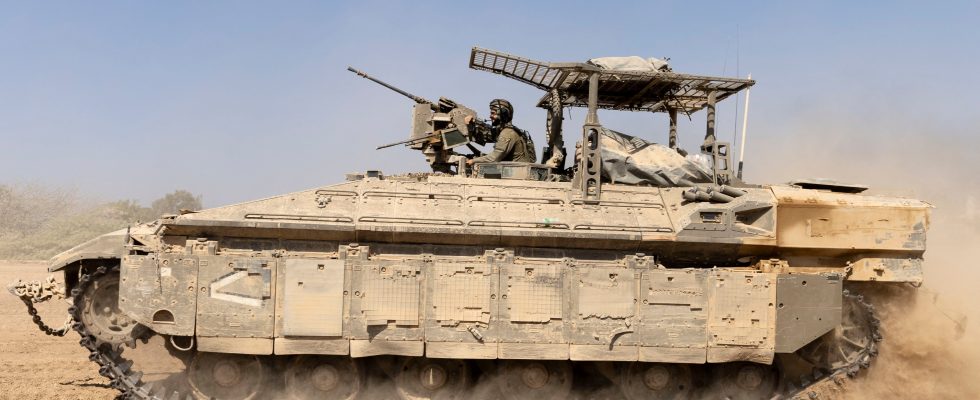Joe Biden was obviously well informed. As early as April 10, the President of the United States shared his concerns: Iran “threatens to launch a major attack against Israel.” Fears confirmed three days later, when Tehran sent more than 300 drones and missiles to the Jewish state – a first since the Iranian Revolution of 1979. The international community fears an escalation which would lead to a regionalization of the Israeli-Palestinian conflict.
The White House insists that it wants to avoid any “extended war with Iran”. And sticks to one position: not to provide military or financial support to Tel Aviv in the event of an escalation. Form of deterrence. But within the ranks of the Israeli government, the question divides. How to respond? Benny Gantz, a member of the war cabinet and main rival of Prime Minister Benjamin Netanyahu, assures that Israel “will impose a price on Iran in the way and at the time that suits us.” This Monday, April 15, while visiting the Nevatim base, in the south of the country, the Chief of Staff did not say much more, promising a “response”. Without, however, specifying its contours. At this stage of the conflict in the Middle East, several avenues are emerging.
Scenario #1: an indirect attack against “proxies”
The first: that of an indirect response. Israel would attack Tehran by striking Iranian relays present in the region, its “proxies”, such as Lebanese Hezbollah, Iraqi Shiite militias or even Yemeni Houthi rebels. A strategy that has been going on for decades and in which Israel excels, notes General Dominique Trinquant. But “attacking these entities would not respond to an unprecedented offensive by a State against another State”, puts into perspective François Heisbourg, special advisor to the Foundation for Strategic Research (FRS).
Scenario #2: a direct attack
A direct attack against Iran cannot therefore be ruled out. On the contrary: “the response would only make sense if it took place on Iranian territory or against the direct interests of Iran”, believes François Heisbourg. The fact remains that in the absence of allied support, Israel is forced to moderate its attack. “By targeting the desert Golan Heights [NDLR : l’attaque sur une caserne israélienne a eu lieu au même moment que celle de l’Iran], Hezbollah was extremely cautious in its offensive. An escalation will therefore be difficult to justify,” explains General Trinquant. Especially since the Israeli defensive arsenal, supported by international support, has made it possible to intercept 99% of Iranian missiles. The IDF could therefore decide to target the bases at the origin of the attack “The advantage is that we target military sites, and not the civilian population, which maintains the conflict at a military and very surgical level”, argues General Nicolas Richoux.
Another avenue studied by the Jewish state: attacks on Iranian nuclear installations – strategic sites for a country which wants to be among the possessors of nuclear weapons. “The Israelis have already hit them in the past via cyberattacks and sabotage operations,” recalls François Heisbourg. But without help from the United States, the operation would risk ending in failure. First: the Israelis do not have the necessary means for such operations, assure our three experts. Second: Iranian nuclear sites are very well protected. This is why the Israelis have every interest in returning to indirect confrontations. But Benyamin Netanyahu seems to be immersed in another logic, that which Dominique Trinquant calls “war to the limit”.
After the failure of October 7 and that of the offensive in Gaza, the head of the Israeli government is looking for victory. “Hamas is not destroyed, the hostages are not released, Netanyahu needs more than ever to show that he remains the strong man in the government coalition,” describes General Richoux. The weight of emotion should not be underestimated. “This type of decision is often taken outside the rational field,” he specifies, adding that “if Putin had been rational in February 2022, he would never have attacked Ukraine, because it was obvious that he had a lot to lose. It is therefore not impossible that Benyamin Netanyahu orders an action which would lead the Iranians to respond in order to force the West to align with Israel’s position. Especially since, since the Iranian offensive, “no one talks about what is happening in Gaza,” notes Dominique Trinquant.
Scenario no. 3: an offensive delayed over time
The third hypothesis, that of an offensive delayed in time, has two advantages: mobilizing support and even better identifying certain targets. “The strike against the Iranian consulate in Damascus at the beginning of April was certainly a long-term effort,” underlines General Trinquant.
In each scenario, however, two elements seem to predominate: temporality and intensity. Tel Aviv is not in a position to wait several weeks before reacting, because the response would risk appearing unrelated to the Iranian attack. But given the position of his allies, it is also possible that Benjamin Netanyahu will be forced to abandon the idea of a massive strike on the mullahs’ regime.
.
